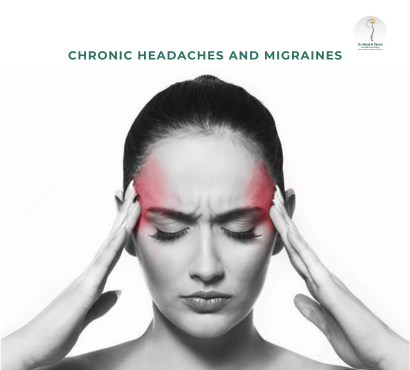Headaches are a common ailment affecting individuals across all age groups. While occasional headaches are typically harmless, chronic headaches and migraines can significantly impact one’s quality of life. Understanding their causes, recognizing symptoms, and exploring treatment options are crucial steps toward effective management.
Understanding Chronic Headaches
Chronic headaches are defined as headaches occurring on 15 or more days per month for at least three months. They can be classified into several types:
- Chronic Migraine: Characterized by migraine symptoms occurring frequently.
- Chronic Tension-Type Headache: Presents as a constant, dull ache on both sides of the head.
- New Daily Persistent Headache: Sudden onset of daily headaches without a clear cause.
- Hemicrania Continua: Continuous, one-sided headache that responds to specific medication.
Migraines: A Closer Look
Migraines are a type of headache disorder marked by recurrent attacks. They often involve:
- Aura: Visual disturbances preceding the headache.
- Pain: Typically throbbing, affecting one side of the head.
- Associated Symptoms: Nausea, vomiting, sensitivity to light and sound.
Migraines can be episodic or chronic, with chronic migraines occurring more than 15 days a month.
Common Triggers
Identifying and avoiding triggers can help manage chronic headaches and migraines:
- Stress: Emotional stress is a significant trigger.
- Diet: Certain foods like aged cheese, processed meats, and caffeine.
- Sleep Patterns: Lack of sleep or oversleeping.
- Hormonal Changes: Especially in women during menstruation.
- Environmental Factors: Bright lights, strong smells, and loud noises.
Diagnosis
Proper diagnosis involves:
- Medical History: Understanding the frequency, duration, and nature of headaches.
- Physical Examination: Checking for signs of neurological issues.
- Imaging Tests: MRI or CT scans to rule out other conditions.
Treatment Options
- Medications:
- Pain Relievers: NSAIDs, acetaminophen.
- Triptans: Specifically for migraines.
- Preventive Medications: Beta-blockers, antidepressants, anticonvulsants.
- Lifestyle Modifications:
- Regular Exercise: Helps reduce stress.
- Dietary Changes: Avoiding known food triggers.
- Sleep Hygiene: Maintaining a consistent sleep schedule.
- Alternative Therapies:
- Acupuncture: May help reduce frequency.
- Biofeedback: Teaches control over physiological functions.
- Botox Injections:
- Approved for chronic migraines, administered every 12 weeks.
When to See a Doctor
Consult a healthcare provider if:
- Headaches are frequent or severe.
- Over-the-counter medications are ineffective.
- Headaches interfere with daily activities.
FAQs
- Can stress cause chronic headaches?
Yes, stress is a common trigger for both tension-type headaches and migraines.
- Are migraines hereditary?
Migraines can run in families, suggesting a genetic component.
- Is it safe to take painkillers regularly for headaches?
Frequent use can lead to medication-overuse headaches. Consult a doctor for proper management.

